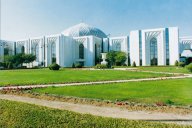


It has been argued that, while oil wealth has transformed the economy and infrastructure of Saudi Arabia in the past three decades, the political machinery of the Kingdom had previously remained unchanged. These measures are seen by some as a cumulative process facilitating the modernization of Saudi Arabian Government but the reforms do not mean that the Kingdom has moved away from its Islamic traditions. King Fahd himself stressed that his reforms were based on Islamic principles of fairness, decency and popular consultation.
Furthermore, the nature of the initial reforms should serve to reassure the religious conservatives. The Council as presently constituted has no lawmaking power, merely the right to summon and question ministers. King Fahd’s choice of Speaker for the first Council – the Justice Minister, Sheikh Muhammad bin Ibrahim bin Jubeir – served to confirm notions that the reform process was intended to be gradual in pace and judicious in development. The Council’s members are selected because they have proved themselves to be responsible and loyal citizens of the Kingdom.

Consultative Council building in Riyadh |
